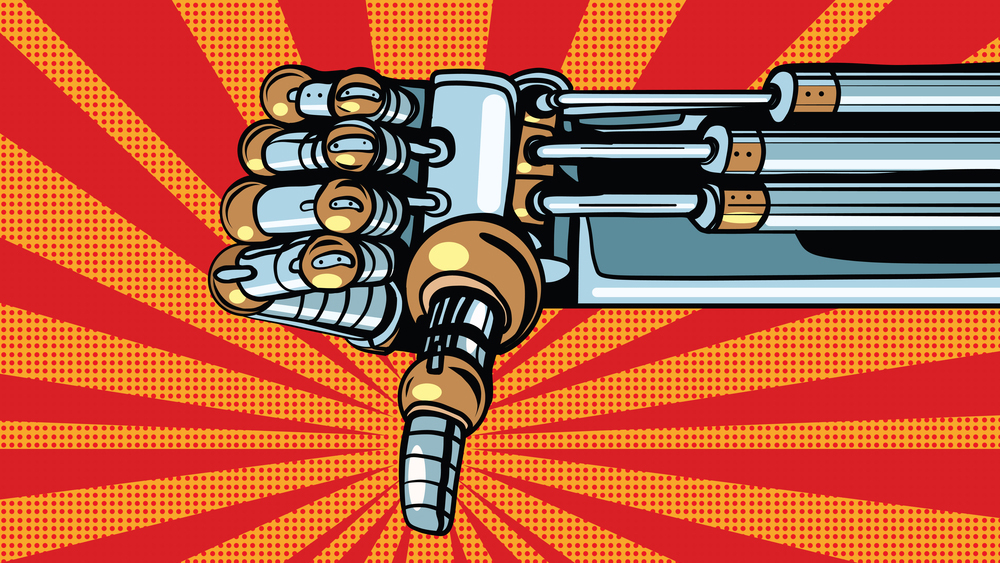Artificial intelligence is just clever marketing, and I’m not buying
It’s painfully obvious that AI is going to become the ‘handmade’ of the 21st century

I've never been one for Instagram. I'm incredibly cynical of everyone and everything, I tend to take pleasure in the misfortune of others, and I rarely post anything myself so Twitter suits me down to the ground.
However, I happened to find myself recently on Instagram, scanning through endless posts about travel and food, when I came across an advert for a clothing service, one that helps you pick a style and a full wardrobe to match. This is one I've seen a few times now, helped in no small part by the fact that every fourth post on Instagram seems to be reserved for adverts let's face it, it's a platform for e-commerce as much as it is a social media.
What's unusual about this clothing service is that it produces its recommendations using an algorithm. You simply put in some basic details about you, such as your age, your usual fit, how much you like to spend clothes shopping, and then browse through a selection of clothes in order to give the algorithm an idea of what you like.
I think it was at this moment that it finally dawned on me that the industry of artificial intelligence, to date, is almost entirely marketing. The term "AI" has become so loose as to become meaningless from the customer's perspective, right or wrong, it covers everything from hyper-intelligent science-fiction to their Amazon Echo speakers. Now, that's great from a marketing perspective, but it's also incredibly manipulative. It makes it easier for brands to label their products as "intelligent" without anyone ever questioning why that is or why we need to be paying twice as much.
"How will this service produce results any different to a bog-standard recommendation feed based on search history?" It doesn't matter it uses AI so it must be good.
The advert reminded me of the "handmade" phenomenon, which still exists today. That's not to say that people don't genuinely prefer objects to be made by hand, particularly when it comes to art or furniture, but "handmade" is now a near-universally positive tag. We seem to want everything made by hand, regardless of what it is, as it's a term we can associate with uniqueness, high quality, and character.
But when a store assistant in Planet Organic tries to convince me of the benefits of "hand-popped" artisan popcorn over regular, bog-standard machine popped, it's hard not to feel like you're sinking into a morass of marketing sludge. The reality is, "handmade" is a term that's been bastardised by marketing. We have been conditioned into thinking that something handmade, by the nature of the manufacturing process, is always far superior to anything produced by a machine. Of course, we know this isn't true, but we can't help that initial feeling we get.
Get the ITPro daily newsletter
Sign up today and you will receive a free copy of our Future Focus 2025 report - the leading guidance on AI, cybersecurity and other IT challenges as per 700+ senior executives
It's that instant positive association that brands have come to rely on, and AI is perhaps the next best candidate for that tactic. We've already seen it deployed to some extent in the cyber security industry, where no matter how many comments I get from customers who say that AI can only do so much to safeguard a business, vendors will still attempt to flog their software as silver bullets. And this is to an audience that knows technology.
It's the reliance on a lack of understanding that's perhaps the most dangerous aspect of all of this. If we're not careful, consumers will soon consider AI as the only thing that differentiates a quality product from the chaff, regardless of whether or not it needs it. The hand made' of the 21st century, if you will.
That said, if you're involved in marketing, I know of a solid money-making scheme.
Dale Walker is a contributor specializing in cybersecurity, data protection, and IT regulations. He was the former managing editor at ITPro, as well as its sibling sites CloudPro and ChannelPro. He spent a number of years reporting for ITPro from numerous domestic and international events, including IBM, Red Hat, Google, and has been a regular reporter for Microsoft's various yearly showcases, including Ignite.
-
 Bigger salaries, more burnout: Is the CISO role in crisis?
Bigger salaries, more burnout: Is the CISO role in crisis?In-depth CISOs are more stressed than ever before – but why is this and what can be done?
By Kate O'Flaherty Published
-
 Cheap cyber crime kits can be bought on the dark web for less than $25
Cheap cyber crime kits can be bought on the dark web for less than $25News Research from NordVPN shows phishing kits are now widely available on the dark web and via messaging apps like Telegram, and are often selling for less than $25.
By Emma Woollacott Published